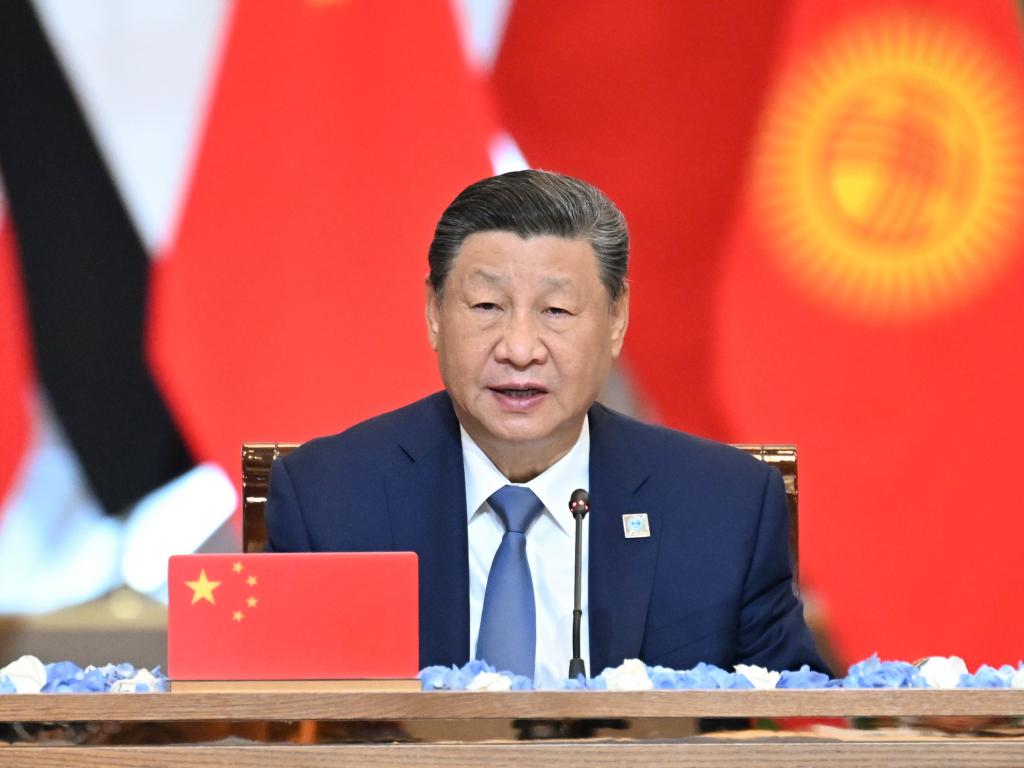Xi warns SCO members of real threat from the Cold War mentality


ASTANA -- President Xi Jinping here Thursday called on the members of the Shanghai Cooperation Organization (SCO) to ensure security in the face of real threat from the Cold War mentality.
Xi made the remarks when attending the 24th Meeting of the Council of Heads of State of the SCO.
He urged the member states to adhere to the vision of common, comprehensive, cooperative and sustainable security, address complex and intertwined security challenges through dialogue and coordination, and respond to the profoundly changing international landscape with a win-win approach, so as to build a world of lasting peace and universal security.
Xi spoke highly of Kazakhstan's positive efforts and significant contributions to improving the operational mechanism of the SCO and deepening cooperation in various fields during its rotating presidency, and welcomed Belarus to attend the SCO summit as a member state for the first time.
He pointed out that the SCO was founded at the turn of the century when confrontations and divisions left by the Cold War had yet to be resolved.
The SCO founding members made a historical decision to pursue peaceful development, commit to good-neighborliness and friendship, and build a new type of international relations, Xi said, adding that the "Shanghai Spirit" has become a shared value and guiding principle for the member states.
Noting that the SCO has had its 10th member state since its establishment 23 years ago, Xi said the foundation for SCO cooperation has become more solid as the SCO "big family" has growing membership which covers three continents around the world.
As the world is faced with accelerating changes unseen in a century, the human society is standing at a crossroads of history again, Xi said.
Xi pointed out that the SCO stands on the right side of history, fairness and justice, and is of great significance to the world.
He called on SCO members to safeguard the right to development in the face of real risks of "small yard, high fences."
Xi noted that SCO members should adhere to mutual benefits and inclusiveness, join hands to push for scientific and technological innovation, keep industrial and supply chains stable and smooth, stimulate the internal impetus of regional economies, and work towards common development goals.
SCO members should consolidate unity and jointly oppose external interference in the face of the real challenges of interference and division, he said.
The SCO members should firmly support each other, accommodate each other's concerns, handle internal differences with a spirit of harmony, and resolve cooperation difficulties by seeking common ground while reserving differences, and firmly grasp the destiny of our countries and the peace and development of the region in our own hands, Xi said.
The SCO has withstood the test of the changing international landscape, the root cause of which lies in the fact that SCO members remain committed to the fine tradition of solidarity and coordination, the way of cooperation featuring equality and mutual benefit, the value pursuit on fairness and justice, and the broad-mindedness of inclusiveness and mutual learning, Xi stressed.
Xi called on the member states to stay true to the original aspiration, continue to uphold the "Shanghai Spirit," help each other on their respective path to success, jointly maintain the development direction of the SCO, and build the organization into a reliable backbone for common prosperity and revitalization of its member states.
Leaders of the SCO members attending the meeting spoke positively of the constructive role of the organization in safeguarding regional peace and security, and voiced readiness to further strengthen cooperation in such areas as trade, transportation, energy, finance, agriculture, digital economy and technological innovation, as well as to deepen people-to-people exchanges and cooperation in education, culture, tourism and youth, among other fields.
Noting that the current global political and economic landscape as well as international relations are undergoing major changes, the leaders said the United Nations should play a central coordinating role in promoting the building of a more representative, democratic and equitable multipolar world system, and pushing for an economic globalization that is mutually beneficial and inclusive.
They called for respecting the legitimate security concerns of all countries, committing to resolve differences and disputes between countries through peaceful means, and opposing unilateral sanctions and interference in other countries' internal affairs.
The leaders agreed to improve the SCO mechanism for dealing with security threats and challenges, resolutely combat the "three forces," drug trafficking and transnational organized crime, support the international community's efforts for peace and development in Afghanistan, and support a comprehensive and just settlement of the Palestinian issue based on the two-state solution.
They signed and issued a series of documents, including an Astana declaration, and an initiative calling for solidarity among countries to promote world justice, harmony and development.
The meeting formally approved Belarus' accession to the SCO, and decided that China will resume the rotating presidency of the organization for 2024-2025.
- More aftershocks expected following deadly Xizang earthquake
- HKSAR chief executive mourns victims of Xizang 6.8-magnitude quake
- Milestones in China's high-speed railway development
- All-China Women's Federation raises over 13 million yuan for quake relief in Xizang
- China's lithium reserves rank second in the world
- China Coast Guard patrols around Diaoyu Dao





































